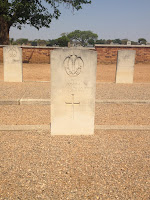The Brokenness of Beautiful Things
I am often asked by friends and family who don't live in Zimbabwe why we still stay here. It is not a question that is easily answered, except to say why does anyone live anywhere? We all have things to complain about wherever we are in the world. Those who don't experience power or water cuts will complain about traffic jams or the weather. Nowhere is perfect.
Recently, I wrote on Facebook how excited we were when the electricity, that had been off for nine days, came back on. It was actually longer as we had had nearly a week prior to this of being one phase down, so we had no lights, but some sockets worked and half of the stove as well. Nine days is by no means a long time at all to go without electricity, and nor is two weeks. Some people I know have gone without for three to six months, a year even. I am sure there are those on my Facebook page who even wonder why I mention it at all. Surely this is to be expected when you live in Africa. Perhaps they are surprised that we even have electricity ever.
My annoyance (anger, actually) with the long power outages and the fact that the community had to pitch together to get it sorted out, is that this is not the way it used to be. I may be looking back at my past through rose tinted glasses, but I cannot remember power cuts as a child unless there was a major thunderstorm, and it usually came back on quite soon.It's not just the electricity that is struggling. Everything, it seems, is broken. Sign posts lean to one side; roads are pitted with pot holes, some big enough to swallow a small car; street lights, their lamps long ago smashed or just never replaced, are contorted into all sorts of shapes. Houses, even in formerly well-off suburbs, are run down; road kerbs are overgrown; the cycle paths, once clearly demarcated along the main roads, have long ago been submerged under the grass.
The hardest burden to bear living here is that of the past. It's difficult to explain to someone who didn't know Zimbabwe's golden days, how lovely it was and well everything worked. Around the world, things change, but generally they change, if not for the better, than for something of equal standing. Here, everything just goes downhill. Go back to the house you grew up in and chances are it will be a shabby version of its former self. Go back to the school you went to and, unless you went to a private school, it is likely to be, well, broken, with an empty swimming pool, an overgrown athletics field, and netball hoops that lean drunkenly above the tall grass.
Why do I stay? Besides all the hand on the heart 'it's my home' stuff, from a writer's point of view, the brokenness of beautiful things can also be a rich source of inspiration. I don't mean that in the sense of exploiting the sadness to my own ends, what some critics have referred to as 'poverty porn'. What I mean is that that awareness of how temporal beauty, structure and meaning are, can give one's writing an edge that might not be possible if everything was neat, clean and upright. Writing is also a form of resistance, a way of telling the world this is not how it should be. The trick, however, is not to live in the past, but see always the strength and endurance of the human spirit in whatever circumstances it is forced to experience.
It would easy to live somewhere else, but I am not sure I would always see the beauty, hidden always behind the perfection of the picture.
This blog post was originally published on Mystery and Intrigue in Bulawayo






Just discovered Bryony thanks to Rick Astley. Love her writing. I grew up in Bulawayo, Henry Low Primary, then Hamilton High. It was in the 60s and 70s. Everything worked. I’ve been back a few times in recent years and everything that can be broken is broken. Some things remain as beautiful as I remember - the people, the weather, Hillside Dams, the Matopos. The few breakable things that remain intact bear testimony to the power of one (or a few), The Museum of Natural History, The Academy of Music. I’m sure there must be many more. Keep it up Bryony. The Power of One.
ReplyDelete